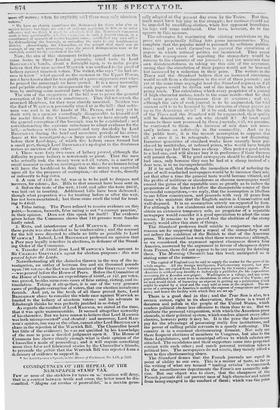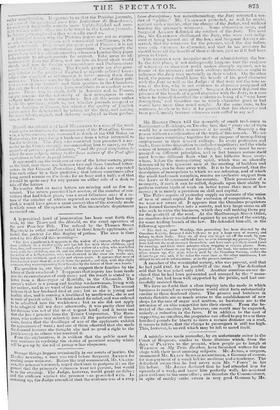CONSEQUENCES OF THE REPEAL OF THE NEWSPAPER STAM P TAX.
FEW or none of the sticklers f rr taxes on usfsrmatien will deny, that in a contest between truth and error, the latter must be dis- ecomfited. "Magna est veritas et preevalebit,' is a maxim gene-
rally adopted at the present day even by the Tories. But then, truth must have fair play in the struggle; her motions should not be impeded by swaddling-clothes, while her opponent brandishes his legs and arms unfettered. Our laws, however, do in fact i operate in this manner.
The advocates for continuing the existing restrictions on the
press are perpetually falling into gross inconsistencies. They complain that the popular mind is poisoned by seditious publica- tions; and yet exert themselves to prevent the circulation of papers in which rational politics are inculcated. They assert that the consequence of repealing the stamp-duty would be ruinous to the character of our journals ; and yet maintain their own disinterestedness in taking up this side of the argument, seeing that the circulation of their papers would not be lessened but increased by a reduction in their price. The writers in the
Times and the Standard believe that an increased circulation would result from a diminution in the cost of those journals ; and yet at the same time argue4at least the Standard argues) as if all such pipers would be driven out of the market by an influx of penny trash. The calculation which every proprietor of a journal of high character makes, tends to the same result—that he shall sell more papers at threepence than at sixpenee ; and yet, although the sale of each journal is to be augmented, the total amount sold is to be lessened by the intrusion of cheap papers got up in the American style ! If it be said, that although the sale of the Times and the Standard will be augmented, their quality will be deteriorated, we ask why should it ? At least equal means to those now possessed by these journals, will, we presume, be continued to them. An increase of sale does not neces- sarily induce an inferiority in the commodity. And as for the public taste, it is the merest assumption to suppose that all at once it is to retrograde. Cheapness is not disgusting. Immense quantities of standard works have recently been pur- chased by multitudes, at reduced prices, who would have bought them long ago had they been as cheap. Men prefer a good article to a bad one, arid will always buy it in preference if their finances will permit them. Why good newspapers should be discarded for bad ones, only because they can be had at a cheap instead of a dear rate, is to us incomprehensible.
If it be said, that though the immediate effect of reducing the price of well-conducted newspapers would be to increase their sale, yet that after a time the general taste would become vitiated, and the profits of seditious or slanderous or obscene newspapers would exceed the gains of the reputable ones so greatly as to induce the proprietors of the latter to follow the disreputable course of their successful competitors,—we reply, that the assumption is libellous to our fellow countrymen, and proceeds with very ill grace from those who maintain that the English nation is Conservative and well-disposed. It is an assumption utterly unsupported by facts. For although a few slanderous and indecent stamped papers do obtain an extensive temporary sale, no proprietor of a reputable newspaper would consider it a good speculation to adopt the same course. It remains to be proved that the abolition of the stamp merely would alter this state of things.
The Standard professes itself unable to conjecture what our reasons are for supposing that a repeal of the stamp-duty would not reduce the condition of the British to that of the American press. We mentioned last week that there were reasons ; although, as we considered the argument against cheapness drawn from America, answered by the argument in favour of cheapness drawn from France, there did not appear to be any necessity for detailing them. The Morning Chronicle has this week anticipated us in stating some of the reasons- " The capital of England may be said to supply the matter for the press of the whole empire. All the foreign intelligence, Parliamentary reports, law pro- ceedings, &c. are copied from the London papers by the Country papers. Now America is without any locality to indemnify a publisher for the expenditure necessary for a Landon newspaper. Washington is a village, and any news- paper published in it must trust to circulation in other parts of the Union ; and no man would think of incurring an expense in getting up a publication which might be copied by a rival and the copy sold as soon as the original. The ex- pense of a newspaper in America is merely the expense of compositors and press- men; and hence the facility with which they are set up."
There is a good deal in this ; and the True Sun is also, to a
certain extent, right in its observation, that there is a want of decorum and polish in the people of the United States, which renders political abuse less offensive to them than to us. But we attribute the personal vituperation, with which the American press abounds, to their political system, which renders almost every office elective, however petty it may be. It is the price the Americans pay for the advantage of possessing really free institutions, and the power of calling public servants to a speedy reckoning. The country is in a constant electioneering ferment. Not only are there frequent elections of members to Congress, but also to the State Legislatures, and to municipal offices to which salaries arc attached. The candidates and their supporters come into perpetual contact with each other; and much personal irritation takes a political hue. The newspapers do not create, they merely afford a vent to this electioneering abuse.
The Standard denies that the French journals are equal in
point of ability to our own. This is a matter of taste, as far as the writing of what are termed " leading articles" is concerned. In time miscellaneous departments the French are assuredly infe- rior. But our object was to show, that the cheapness of the French journals did not prevent men of high character and talent from being engaged in the conduct of them; which was the point
• eentjelerliti• a. It ,:p cars to us that the Parisian journals,
tee,1 aee ,,f the I let ma A (the indisatteur (IP Bourdewer, f•r ceo es..e) freqt-atitly contein more highly-fluished and care- fit", tt-! ratedare to betonal in the London journals.
tet s tel•o they m;.n.a•dly excel us. A reita•'.-: etliy the Parisian peper; are rot so copious .• lo ess teel ia.nunercial intelligence, is the
leatitt ••• Pa i-t net lee great. part of France ; it is not ee•.:1 et• inii..ttf.teturing emporiutn. Consequently the
pari '•• •••• !leer t emelt ts ; whereas a London daily paper leeks nit:ally to a& erti••ements for support. Take away its ad-
vertkc f'. Li the Tiors, atid see how its broad sheet would eial how it, f 'reign r )rreseoirlenve and Parliamentary
it: • away. The French people arc also gene- ..,,.:. r ;•, p •.`.... El:gland regards political know- he tee rinatien is lower among them than
aearet,i les : t.or the infers ,rite of mat y of their poll-
tied ce rets ut .,.• But !et:I; ilw he. t Tii _ it .•,
lett:ide the glee Ltd in .'•• • the the sat ea tat. , , nue, ar before.
and their epeeehes its the Chambers. have contribute to or conduct newa- leith is America and in Fitance,
tail plc rea.. 1•,1' i ieferiovity of their newspapers to ours wit:lout ref, l c t i.a statue-tanZ v. But all this seems rather It is, mat whether journals are good or :al.ee, bet whether the quality of English at d by taking oh' the duty, and lea% ing and industry employed in 'their produc-





















 Previous page
Previous page